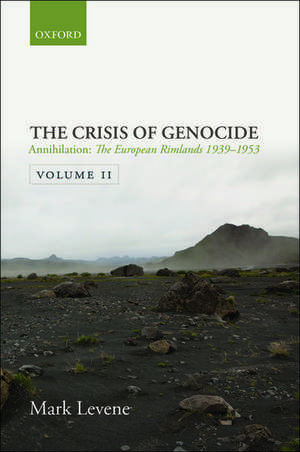Annihilation: Volume II: The European Rimlands 1939-1953: Crisis Of Genocide
Autor Mark Leveneen Limba Engleză Hardback – 19 dec 2013
Preț: 664.95 lei
Preț vechi: 884.52 lei
-25% Nou
Puncte Express: 997
Preț estimativ în valută:
127.23€ • 133.20$ • 105.28£
127.23€ • 133.20$ • 105.28£
Carte tipărită la comandă
Livrare economică 25-31 martie
Preluare comenzi: 021 569.72.76
Specificații
ISBN-13: 9780199683048
ISBN-10: 0199683042
Pagini: 554
Ilustrații: 5 black and white maps
Dimensiuni: 163 x 241 x 37 mm
Greutate: 0.97 kg
Editura: OUP OXFORD
Colecția OUP Oxford
Seria Crisis Of Genocide
Locul publicării:Oxford, United Kingdom
ISBN-10: 0199683042
Pagini: 554
Ilustrații: 5 black and white maps
Dimensiuni: 163 x 241 x 37 mm
Greutate: 0.97 kg
Editura: OUP OXFORD
Colecția OUP Oxford
Seria Crisis Of Genocide
Locul publicării:Oxford, United Kingdom
Recenzii
The book's breadth of vision, attention to detail, and awareness of synchronicity across these very different regions are remarkable ... [The Crisis of the Genocide is] a remarkable, rich and suggestive history of national projects of elimination in Europe's murderous first half of the twentieth century.
On the whole Mark Levene's impressive study is an extremely readable, informative, and timely book. It should become compulsory reading for Europe's youth in order to make sure that the events that have uprooted Europe in the first half of the 20th century will never happen again.
A renewed purpose for historians of genocide ... a masterclass in the genesis of genocide ... a great accomplishment. Levene's emphasis on the modern political system as the causative element in genocides has opened up fruitful lines of thinking and has advanced the field in major ways ... These volumes dramatically expand our definition of genocide.
Few scholars match his [Levene's] panoptic erudition, synthetic ability, cosmopolitan sensitivity, and attention to detail ... a very well-written, thoroughly researched, convincingly argued, and informative book that can be recommended for a broad audience including upper-level undergraduate and graduate students.
This extremely ambitious work provides a very knowledgeable and enormously broad survey of violence in large parts of Europe and southwest Asia from the 1910s to the early 1950s.
On the whole Mark Levene's impressive study is an extremely readable, informative, and timely book. It should become compulsory reading for Europe's youth in order to make sure that the events that have uprooted Europe in the first half of the 20th century will never happen again.
A renewed purpose for historians of genocide ... a masterclass in the genesis of genocide ... a great accomplishment. Levene's emphasis on the modern political system as the causative element in genocides has opened up fruitful lines of thinking and has advanced the field in major ways ... These volumes dramatically expand our definition of genocide.
Few scholars match his [Levene's] panoptic erudition, synthetic ability, cosmopolitan sensitivity, and attention to detail ... a very well-written, thoroughly researched, convincingly argued, and informative book that can be recommended for a broad audience including upper-level undergraduate and graduate students.
This extremely ambitious work provides a very knowledgeable and enormously broad survey of violence in large parts of Europe and southwest Asia from the 1910s to the early 1950s.
Notă biografică
Mark Levene is Reader in Comparative History at the University of Southampton, and in the Parkes Centre for Jewish / non-Jewish Relations. His writing ranges from Jewish history to genocide and anthropogenic climate change, including, most recently History at the End of the World? History, Climate Change and the Possibility of Closure (co-edited with Rob Johnson and Penny Roberts, 2010). He is founder of Rescue! History, and co-founder of the Crisis Forum. The two volumes of Crisis of Genocide continue a multi-volume project - begun with The Meaning of Genocide and The Rise of the West and the Coming of Genocide (2005) - to chart the history of genocide in the age of the nation-state.

